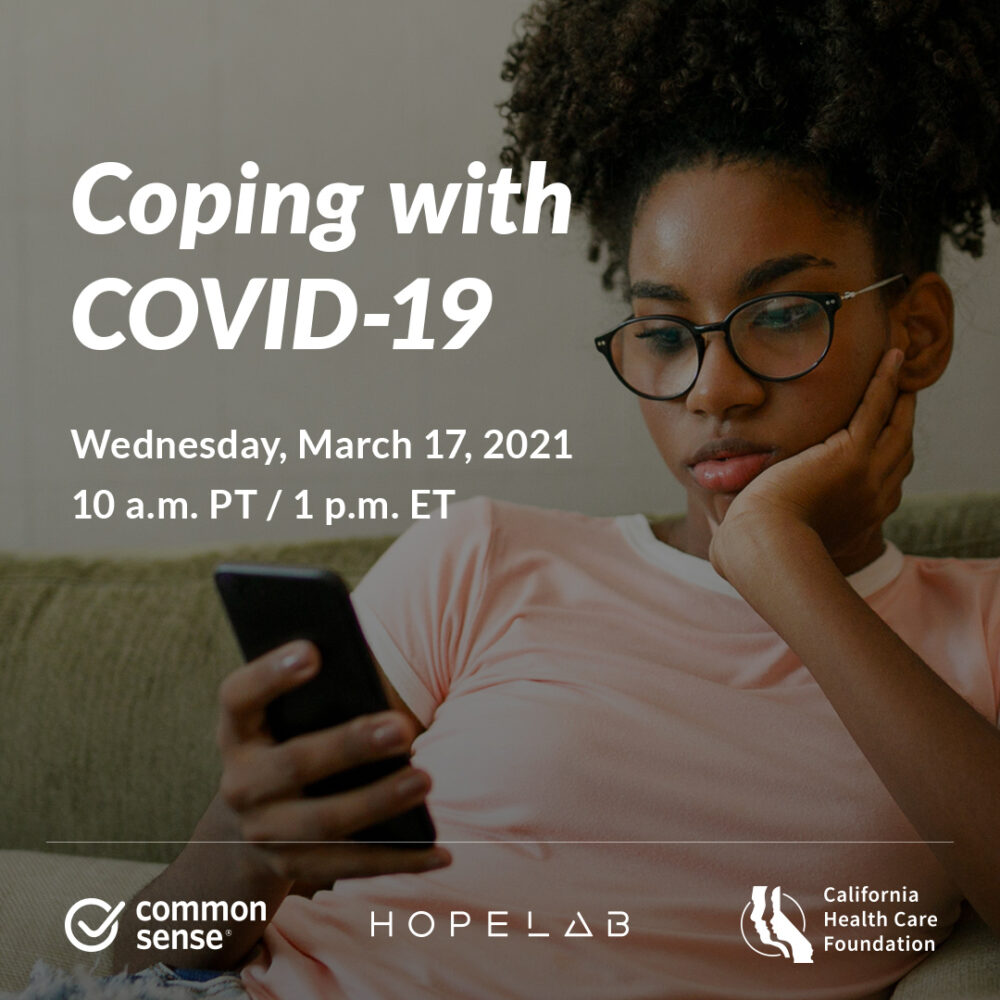
In September – November 2020, Vicky Rideout and I partnered with Common Sense, the California Health Care Foundation, and Hopelab, to field a nationally representative survey of more than 1,500 14- to 22-year-olds in the U.S. We focused on how teens and young adults are coping in the pandemic, updating some of our 2018 findings and adding new questions related to COVID-19 and substance use.
The complete report is available here.
Key findings:
- Nearly four in 10 (38%) teens and young adults report symptoms of moderate to severe depression, up substantially from 25% just two years ago.
- Fully half (51%) of all young people who report a COVID-19 infection in their family also report symptoms of moderate to severe depression (compared to 36% of those who have not experienced COVID-19-related illness in their families).
- Exposure to hate speech on social media is up substantially over the past two years.
- Social media has played an important role in keeping young people informed and connected during the coronavirus pandemic, especially for those most directly affected by the virus.
- Young people make extensive use of a variety of digital health resources; those with depression are even more likely to do so.
- 40% of teens and young adults have looked online for “health peers” (people with health concerns similar to their own).
- Nearly two out of three LGBTQ+ youth report moderate to severe symptoms of depression, twice the rate among non-LGBTQ+ young people.
- Young people with moderate to severe depressive symptoms are nearly twice as likely as those without depression to say they use social media almost constantly (34% vs. 18%).
- Social media platforms have become even more important to young people for support, community, and self-expression over the past two years, especially for those experiencing depression.
- Young people are far more likely to say that using social media makes them feel better rather than worse when they’re depressed, stressed, or anxious, and that rate has gone up substantially since 2018.
- About one in 10 (9%) of young people in the survey is at risk for problematic substance use, and 46% of those respondents say they have sought information about drug and alcohol abuse online.
We included lots of opportunities for respondents to tell us what they think, in their own words. A few quotes:
“I guess just seeing people expressing themselves the way they want makes me happy because I can’t really do that.”
– 14-year-old nonbinary person
“Sometimes I get depressed or anxious about certain things that I deal with, and I wanted to know if other teens felt the same way I do. I found others who sometimes feel like I do, and what they do to overcome it.”
– 16-year-old girl
“I was stressed and felt like I needed an objective view. Online I was able to find a teenager help line. It gave me comfort knowing there was someone to talk to besides my mom.”
– 17-year-old boy
“When the virus became a big deal, I looked online to better understand ways to deal with anxiety. I found some good relaxing techniques that helped me calm down.”
– 21-year-old man
Alanna Peebles of Common Sense Media created a suite of useful fact sheets:
- COVID-19, depression, and social media use / El coronavirus, la depresión y el uso de redes sociales entre adolescentes y adultos jóvenes (de 14 a 22 años).
- Black youth
- Hispanic/Latinx youth / La salud mental, las prácticas de salud digital y el uso de redes sociales entre adolescentes y adultos jóvenes hispanos / latinos en Estados Unidos (de 14 a 22 años).
- LGBTQ+ youth
- Female youth
- Problematic substance use
- Telehealth
I will continue to add more findings to this page. We are excited to see what data points and quotes resonate with people!
Recent Comments